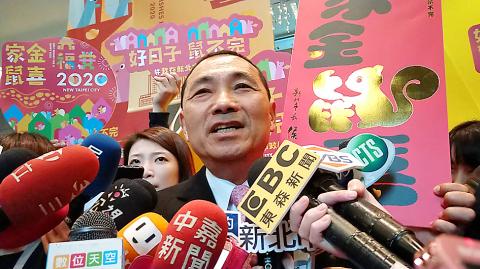The Chinese Nationalist Party (KMT) is to form a task force to review its defeats in Saturday’s presidential and legislative elections, and propose plans to reform the party, KMT deputy spokesman Huang Hsin-hua (黃心華) said yesterday.
Top party officials met for the first time since the elections, and the party’s “major setbacks” were discussed and an agreement reached to establish a task force to thoroughly review the party’s performance and propose reform plans, Huang said.
They also discussed the resignation of KMT Chairman Wu Den-yih (吳敦義) and executive-level members, he said, adding: “Once the Central Standing Committee approves of it, a chairperson by-election will be held immediately.”

Photo: Lai Hsiao-tung, Taipei
To ensure the operation of the party during the transitional period, all management-level members have been urged to continue carrying out their duties, he said.
Among those at the meeting were KMT Vice Chairman Tseng Yung-chuan (曾永權), Organizational Development Committee director Tu Chien-teh (杜建德), Culture and Communications Committee director-general Cheng Mei-hua (程美華), Administration and Management Committee director Chiu Da-chan (邱大展), Disciplinary Committee director Wei Ping-cheng (魏平政) and other executive-level members.
Wu on Saturday night said that he and all executive-level members involved in the elections would tender their resignation to the Central Standing Committee tomorrow to take responsibility for the defeats.
The committee is expected to approve Wu’s resignation, but no one has yet publicly committed to running to succeed him.
KMT Tainan chapter head Hsieh Lung-chieh (謝龍介) had previously said that he would run for chairmanship after the elections, but he appears to be rethinking the move.
Party members have floated the names of Kaohsiung Mayor Han Kuo-yu (韓國瑜), New Taipei City Mayor Hou You-yi (侯友宜), and KMT legislators Chiang Wan-an (蔣萬安) and Johnny Chiang (江啟臣).
Asked by reporters in Kaohsiung yesterday if he was interested, Han said he “has absolutely no plan” to run for chairman.
In an interview with China Review News Agency published yesterday, Johnny Chiang denied considering the idea, saying his priority is to stabilize things on the legislative front for the KMT.
Hou and Chiang Wan-an were vague when pressed on Sunday.
As New Taipei City mayor, he is preoccupied with his job of running the city, Hou said, adding yesterday that KMT members should calm down and ponder the party’s issues and its next steps.
Chiang Wan-an said that the KMT must thoroughly review its losses and that its problems “would not be solved in a short time.”
Additional reporting by Tsai Wen-chu and CNA

CHAOS: Iranians took to the streets playing celebratory music after reports of Khamenei’s death on Saturday, while mourners also gathered in Tehran yesterday Iranian Supreme Leader Ayatollah Ali Khamenei was killed in a major attack on Iran launched by Israel and the US, throwing the future of the Islamic republic into doubt and raising the risk of regional instability. Iranian state television and the state-run IRNA news agency announced the 86-year-old’s death early yesterday. US President Donald Trump said it gave Iranians their “greatest chance” to “take back” their country. The announcements came after a joint US and Israeli aerial bombardment that targeted Iranian military and governmental sites. Trump said the “heavy and pinpoint bombing” would continue through the week or as long

TRUST: The KMT said it respected the US’ timing and considerations, and hoped it would continue to honor its commitments to helping Taiwan bolster its defenses and deterrence US President Donald Trump is delaying a multibillion-dollar arms sale to Taiwan to ensure his visit to Beijing is successful, a New York Times report said. The weapons sales package has stalled in the US Department of State, the report said, citing US officials it did not identify. The White House has told agencies not to push forward ahead of Trump’s meeting with Chinese President Xi Jinping (習近平), it said. The two last month held a phone call to discuss trade and geopolitical flashpoints ahead of the summit. Xi raised the Taiwan issue and urged the US to handle arms sales to

State-run CPC Corp, Taiwan (CPC, 台灣中油) yesterday said that it had confirmed on Saturday night with its liquefied natural gas (LNG) and crude oil suppliers that shipments are proceeding as scheduled and that domestic supplies remain unaffected. The CPC yesterday announced the gasoline and diesel prices will rise by NT$0.2 and NT$0.4 per liter, respectively, starting Monday, citing Middle East tensions and blizzards in the eastern United States. CPC also iterated it has been reducing the proportion of crude oil imports from the Middle East and diversifying its supply sources in the past few years in response to geopolitical risks, expanding

Pro-democracy media tycoon Jimmy Lai’s (黎智英) fraud conviction and prison sentence were yesterday overturned by a Hong Kong court, in a surprise legal decision that comes soon after Lai was jailed for 20 years on a separate national security charge. Judges Jeremy Poon (潘兆初), Anthea Pang (彭寶琴) and Derek Pang (彭偉昌) said in the judgement that they allowed the appeal from Lai, and another defendant in the case, to proceed, as a lower court judge had “erred.” “The Court of Appeal gave them leave to appeal against their conviction, allowed their appeals, quashed the convictions and set aside the sentences,” the judges